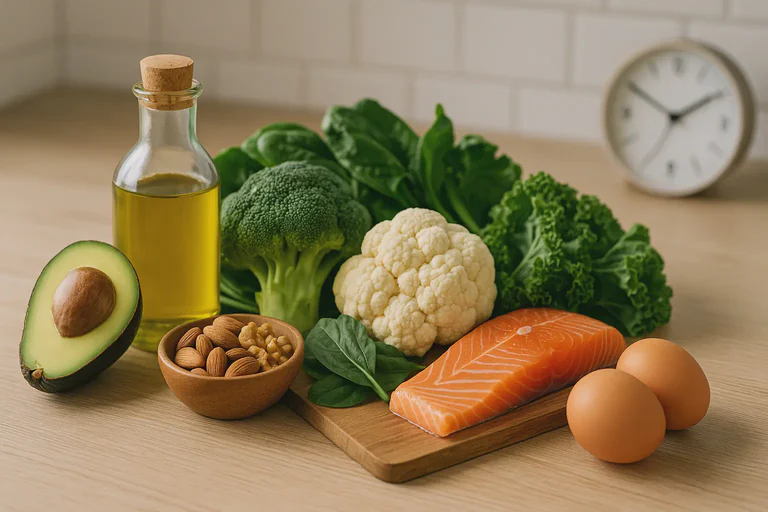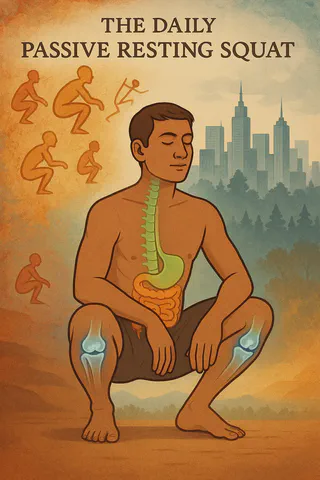Introduction: Why Traditional Fat Loss Approaches Often Fail
You've probably been there—counting every calorie, spending hours on cardio machines, and cutting fat from your diet, only to experience temporary results followed by frustrating weight regain. What if I told you that sustainable fat loss isn't primarily about thermodynamics (calories in vs. calories out) but rather about understanding and controlling your hormones, particularly insulin?
This comprehensive guide explores the hormone-first approach to fat loss, drawing from scientific research and practical strategies to help you achieve lasting health, fitness, and longevity. While the evidence is promising, there's ongoing debate in the scientific community, so we'll keep things open-ended and adaptable to your individual needs.
- Research suggests sustainable fat loss may depend more on managing hormones, especially insulin, than just counting calories, though calorie balance remains important.
- Insulin likely plays a key role in fat storage, with high levels potentially locking fat in storage, supported by studies on insulin resistance.
- Evidence indicates real foods (e.g., vegetables, meats) support metabolic health, while ultra-processed foods (e.g., sugary snacks) may disrupt insulin regulation.
- Becoming fat-adapted, where your body efficiently burns fat for energy, might reduce hunger and enhance fat loss, typically taking 4-12 weeks of low-carb eating.
- A low-carb, high-fat diet with two meals daily is proposed to control insulin, though individual results vary due to genetic or lifestyle factors.
- Common nutrition myths like "eating fat makes you fat" are likely overstated based on current science.
- Gut health appears important for metabolism and fat loss, with evidence linking gut bacteria diversity to weight management.
The Hormone-First Paradigm: A Different Perspective
For decades, the fitness and nutrition industries have promoted a simplistic view of fat loss: create a calorie deficit through diet and exercise, and you'll lose weight. While this isn't entirely wrong, it's incomplete. The hormone-first approach suggests that this frustration stems from misinformation propagated by food and fitness industries prioritizing profit over health.
Research, such as [1] the Carbohydrate-Insulin Model of Obesity, supports that high-carbohydrate diets, especially those with a high-glycemic load, cause postprandial hyperinsulinemia (elevated insulin after meals). This promotes calorie deposition in fat cells, reduces blood stream calories, increases hunger, and can slow metabolic rate.
This model considers fat cells central to obesity, not passive calorie storage, with insulin exerting dominant anabolic control by:
- Stimulating glucose uptake
- Suppressing fatty acid release
- Promoting fat deposition
Understanding Insulin: The Master Fat-Storage Hormone
Insulin, released by the pancreas in response to rising blood glucose, directs muscle, fat, and liver cells to absorb glucose for energy or storage as fat. [2] The NIH study on insulin and fat cells used high-resolution imaging to show insulin binding to cell receptors, prompting GLUT4 transporters to ferry glucose inside, with excess converted to fat for long-term storage.
High insulin levels, often from frequent carbohydrate intake, can lead to hyperinsulinemia, linked to excess body fat and metabolic conditions like insulin resistance, as noted in [3] Disordered Fat Storage and Mobilization.
The Carbohydrate-Insulin Model suggests that dietary quality, not just quantity, shifts calorie partitioning toward fat tissue, driving hunger and overeating. Animal studies show high- vs. low-glycemic index diets lead to hyperinsulinemia, increased adiposity, and lower energy expenditure, even with calorie control, supporting the idea that insulin management is key for fat loss.
Real Food vs. Ultra-Processed Foods: The Foundation of Hormonal Health
The distinction between real and ultra-processed foods is critical for insulin control. Real foods naturally contain micronutrients necessary for converting macronutrients into energy and tissue. Examples include:
- Vegetables and fruits
- Meats, fish, and eggs
- Nuts and seeds
- Natural fats like avocados and olive oil
Ultra-processed foods, however, are industrially formulated, often starting with real food but stripped of nutrients and loaded with chemicals, sugar, additives, and preservatives for profit, as seen in industrialized breads, pre-prepared meals, and soft drinks.
[4] Research on ultra-processed foods reports that in high-income countries like the UK, ultra-processed foods constitute 56.8% of total energy intake, linked to higher rates of cardiovascular disease and all-cause mortality. Prospective studies in children show associations with added sugar content and adverse anthropometric and glucose profiles.
To choose real foods, check ingredient lists; single-ingredient foods typically don't need marketing terms like "low-fat" or "high-protein," which often hide harmful additives.
Becoming Fat-Adapted: Teaching Your Body to Burn Fat Efficiently
Becoming fat-adapted, or metabolically flexible, means teaching your body to efficiently burn both carbohydrates and stored fat for energy, reducing hunger and increasing energy levels. [5] Metabolic Flexibility as an Adaptation defines it as the ability to adapt metabolism by substrate sensing, trafficking, storage, and utilization, depending on availability and demand, crucial for energy homeostasis during feeding, fasting, and exercise.
Most people with excess body fat are metabolically inflexible, primarily burning carbohydrates and feeling tired despite having abundant fat stores. Fat adaptation typically takes 4-12 weeks depending on:
- Age
- Current body fat levels
- Dieting history
- Sex
- Genetics
The process involves lowering carb intake to 20-50 grams daily, increasing healthy fats, and monitoring progress through reduced hunger and stable energy. Benefits include improved insulin sensitivity, reduced metabolic disease risk, and support for healthy aging.
️ Practical Implementation: A Hormone-First Eating Strategy
To control insulin and become fat-adapted, consider this practical approach:
Food Choices
- Animal Proteins with Fat: Chicken thighs, ribeye steak, salmon
- Healthy Fats: Avocados, olives, nuts, cheese, butter, coconut oil, extra virgin olive oil
- Cruciferous Vegetables: Kale, spinach, broccoli, cauliflower
Meal Timing
- Two Meals Daily: First between 12:00-1:00 PM, second between 6:00-7:00 PM
- No Snacking: Keep insulin low by avoiding food between meals
- Hydration: Drink water only, avoiding diet drinks full of chemicals
Sample 3-Day Meal Plan
Day 1
- Breakfast (12:00 PM): 3 eggs cooked in butter, half an avocado, handful of spinach
- Dinner (6:00 PM): 150g ribeye steak with butter, sautéed kale, roasted broccoli
Day 2
- Breakfast (12:00 PM): Bulletproof coffee (coffee with 1 tbsp butter, 1 tbsp MCT oil), small handful of almonds
- Dinner (6:00 PM): Grilled salmon drizzled with olive oil, steamed asparagus, side salad with olive oil dressing
Day 3
- Breakfast (12:00 PM): Omelette with cheese, spinach, and mushrooms, cooked in coconut oil
- Dinner (6:00 PM): Chicken thighs with garlic butter, cauliflower mash, small portion of raspberries
Adjust portions based on your individual size and activity level. If you feel tired or unusually hungry after meals, investigate whether you're experiencing insulin spikes.
Debunking Common Fat Loss Myths
Several persistent myths hinder effective fat loss:
"Eating fat makes you fat"
Research shows fat storage is driven primarily by high insulin from sugar and refined carbohydrates, not dietary fat. Eating fat with carbs can raise insulin, but fat alone has minimal impact on insulin levels.
"Cholesterol in eggs is bad"
[6] Current research indicates dietary cholesterol has little effect on blood cholesterol for most people, with eggs supporting overall health. High cholesterol is often linked to ultra-processed foods, not eggs.
"Eating tons of fruit is always healthy for fat loss"
Fruits contain fructose, which can overload the liver and contribute to insulin resistance when consumed in excess. During fat adaptation, consider limiting fruit to berries, which have lower sugar content.
"Relying solely on cardio is effective for fat loss"
Fat loss is primarily diet-driven, with exercise contributing only 10-15% to results. Walking is suggested for general movement, rather than intense cardio sessions that may increase hunger and stress hormones.
The Gut Health Connection
Maintaining good gut health is crucial for metabolic function, including liver function affecting fat loss. [7] Research on weight loss and gut microbiota shows increasing weight loss is positively associated with increases in gut microbiota α-diversity and reductions in intestinal permeability.
To support gut health:
- Consume fermented foods like yogurt and kefir
- Avoid harmful substances like diet drinks and seed oils
- Eat fiber-rich vegetables
- Consider intermittent fasting to give your gut rest
⏱️ Consistency and Patience: The Key to Success
Achieving fat adaptation requires consistency and patience. This is presented as a lifestyle change, not a temporary diet. Sticking to recommended foods for one to two weeks can lead to reduced tiredness and hunger as the body accesses stored fat, emphasizing long-term adherence for lasting results.
Remember that individual responses vary based on:
- Metabolic health
- Genetic factors
- Activity levels
- Stress management
- Sleep quality
Conclusion: A Sustainable Approach to Fat Loss and Health
The hormone-first approach to fat loss offers a promising alternative to traditional calorie-counting methods. By focusing on insulin management through real food consumption, strategic meal timing, and becoming fat-adapted, you may achieve more sustainable results while improving overall health markers.
While this approach has strong scientific support, it's important to recognize that nutrition science continues to evolve, and individual responses vary. Consider consulting with healthcare professionals before making significant dietary changes, especially if you have existing health conditions.
What small step will you take today toward hormonal balance and sustainable fat loss?
References and Further Reading
For deeper exploration of these concepts, consider these resources:
Videos
- 45 Years Of No-BS Fat Loss Advice: https://www.youtube.com/watch?v=yccagjYAKOg
- Role of Insulin in Lipogenesis and Fat Storage: https://www.youtube.com/watch?v=EcVD9ku8n3A
Scientific Studies
- The Carbohydrate-Insulin Model of Obesity: Beyond 'Calories In, Calories Out': https://www.ncbi.nlm.nih.gov/pmc/articles/PMC6082688/
- NIH study shows how insulin stimulates fat cells to take in glucose: https://www.nih.gov/news-events/news-releases/nih-study-shows-how-insulin-stimulates-fat-cells-take-glucose
- Disordered Fat Storage and Mobilization in the Pathogenesis of Insulin Resistance and Type 2 Diabetes: https://academic.oup.com/edrv/article-abstract/23/2/201/2424219
- Ultra-Processed Foods Are Not "Real Food" but Really Affect Your Health: https://pmc.ncbi.nlm.nih.gov/articles/PMC6723973/
- Metabolic Flexibility as an Adaptation to Energy Resources and Requirements in Health and Disease: https://academic.oup.com/edrv/article/39/4/489/4982126
- The Benefits of Eggs: https://collectedmed.com/nutrition-diet/top-health-benefits-of-eggs/
- The association of weight loss with changes in the gut microbiota diversity, composition, and intestinal permeability: https://pmc.ncbi.nlm.nih.gov/articles/PMC8796717/
Additional Studies (Not referenced in text)
- Dietary Alteration of the Gut Microbiome and Its Impact on Weight and Fat Mass: https://www.ncbi.nlm.nih.gov/pmc/articles/PMC5867888/


